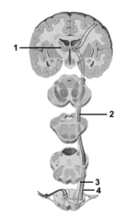A) rubrospinal tract.
B) reticulospinal tact.
C) tectospinal tract.
D) vestibulospinal tract.
E) None of the choices is correct.
G) A) and C)
Correct Answer

verified
Correct Answer
verified
Multiple Choice
The inability to either recognize or understand the meaning of various stimuli is termed
A) dyslexia.
B) ataxia.
C) hemiballismus.
D) agnosia.
E) aprosodia.
G) A) and B)
Correct Answer

verified
Correct Answer
verified
Multiple Choice
The corticobulbar tracts originate from the ______ region of the motor homunculus within the primary cortex.
A) cardiac
B) facial
C) palmar
D) genitalia
E) respiratory
G) B) and E)
Correct Answer

verified
Correct Answer
verified
Multiple Choice
Immediately posterior to the Wernicke area is the angular gyrus.What does this gyrus do?
A) Transforms images into visual reality
B) Processes the words we read into a form we can speak
C) Translates the audible word into a spoken form
D) Processes olfactory information
E) Transforms smells into visual images
G) B) and E)
Correct Answer

verified
Correct Answer
verified
True/False
A cerebrovascular accident (stroke)is caused by an increase in blood supply to a part of the brain due to a blocked or damaged arterial blood vessel.
B) False
Correct Answer

verified
Correct Answer
verified
Multiple Choice
Which is a deep and profound state of unconsciousness from which a person cannot be aroused?
A) Stupor
B) Syncope
C) Lethargy
D) Coma
E) Faint
G) C) and D)
Correct Answer

verified
Correct Answer
verified
Multiple Choice
The Wernicke area is responsible for
A) recognizing the emotional content of words.
B) relating odor to past experience.
C) correlating auditory information.
D) storing and processing memory.
E) recognizing written and spoken language.
G) B) and C)
Correct Answer

verified
Correct Answer
verified
Multiple Choice
This pathway conducts sensory stimuli concerned with proprioceptive information about limb position and discriminative touch,precise pressure,and vibration sensations.It projects through the spinal cord,brainstem,and diencephalon before terminating within the cerebral cortex.
A) The posterior funiculus-medial lemniscal pathway
B) The anterolateral pathway
C) The musculomedial pathway
D) The spinocerebellar pathway
E) The posterolateral pathway
G) D) and E)
Correct Answer

verified
A
Correct Answer
verified
Multiple Choice
 -This figure shows the anterolateral pathway.What structure does number 4 indicate?
-This figure shows the anterolateral pathway.What structure does number 4 indicate?
A) Tertiary neuron
B) Primary neuron
C) Anterior spinothalamic tract
D) Lateral spinothalamic tract
E) Posterior spinothalamic tract
G) B) and C)
Correct Answer

verified
D
Correct Answer
verified
Multiple Choice
Which type of memory is required to perform several different mental activities simultaneously?
A) Sensory memory
B) Short-term memory
C) Long-term memory
D) Working memory
E) Interactive memory
G) A) and C)
Correct Answer

verified
Correct Answer
verified
Multiple Choice
Complex unconscious motor patterns are controlled by neurons in various locations.The ones that control swinging the arms while walking are located in the
A) mesencephalon.
B) cerebellum.
C) hypothalamus.
D) cerebral nuclei.
E) medulla oblongata.
G) C) and E)
Correct Answer

verified
Correct Answer
verified
Multiple Choice
Brain growth is 95 percent complete by the age of
A) 6 months.
B) 1 year.
C) 2 years.
D) 3 years.
E) 5 years.
G) A) and C)
Correct Answer

verified
Correct Answer
verified
True/False
Following birth,the CNS continues to mature and gain in complexity.As it matures many neurons expand their number of connections.
B) False
Correct Answer

verified
Correct Answer
verified
Multiple Choice
In general,left-handed people have a ________________,which suggests that more signals may be relayed between their hemispheres.
A) thinner corpus callosum
B) larger pons
C) larger thalamus
D) thicker medulla
E) thicker corpus callosum
G) A) and C)
Correct Answer

verified
Correct Answer
verified
Multiple Choice
This pathway conducts proprioceptive information to the cerebellum for processing to coordinate body movements such as posture,balance,and skilled movements.
A) The posterior funiculus-medial lemniscal pathway
B) The anterolateral pathway
C) The musculomedial pathway
D) The spinocerebellar pathway
E) The posterolateral pathway
G) B) and E)
Correct Answer

verified
Correct Answer
verified
Multiple Choice
Which is not a somatosensory pathway?
A) The posterior funiculus-medial lemniscal pathway
B) The anterolateral pathway
C) The musculomedial pathway
D) The spinocerebellar pathway
E) All of the choices are correct.
G) A) and B)
Correct Answer

verified
Correct Answer
verified
Multiple Choice
Mental processes such as awareness,knowledge,memory,perception,and thinking are collectively called
A) intelligence.
B) higher-order processing.
C) cognition.
D) ataxia.
E) hemiballismus.
G) A) and E)
Correct Answer

verified
C
Correct Answer
verified
Multiple Choice
The effects of aging on the brain begin at about ________ of age.
A) 20 years
B) 30 years
C) 40 years
D) 50 years
E) 60 years
G) A) and D)
Correct Answer

verified
Correct Answer
verified
Multiple Choice
Which of these movements or muscle groups is not controlled by motor information transmitted by the corticobulbar tracts?
A) Eye movements
B) Certain superficial muscles of the back and neck
C) Muscles of the upper leg
D) Cranial,facial,pharyngeal,and laryngeal muscles
E) Intrinsic and extrinsic tongue muscles
G) D) and E)
Correct Answer

verified
Correct Answer
verified
Multiple Choice
Which is a form of impaired memory processing that occurs following years of alcohol abuse?
A) Korsakoff psychosis
B) Anterograde amnesia
C) Retrograde amnesia
D) Prosttraumatic amnesia
E) Hysterical amnesia
G) B) and D)
Correct Answer

verified
Correct Answer
verified
Showing 1 - 20 of 90
Related Exams